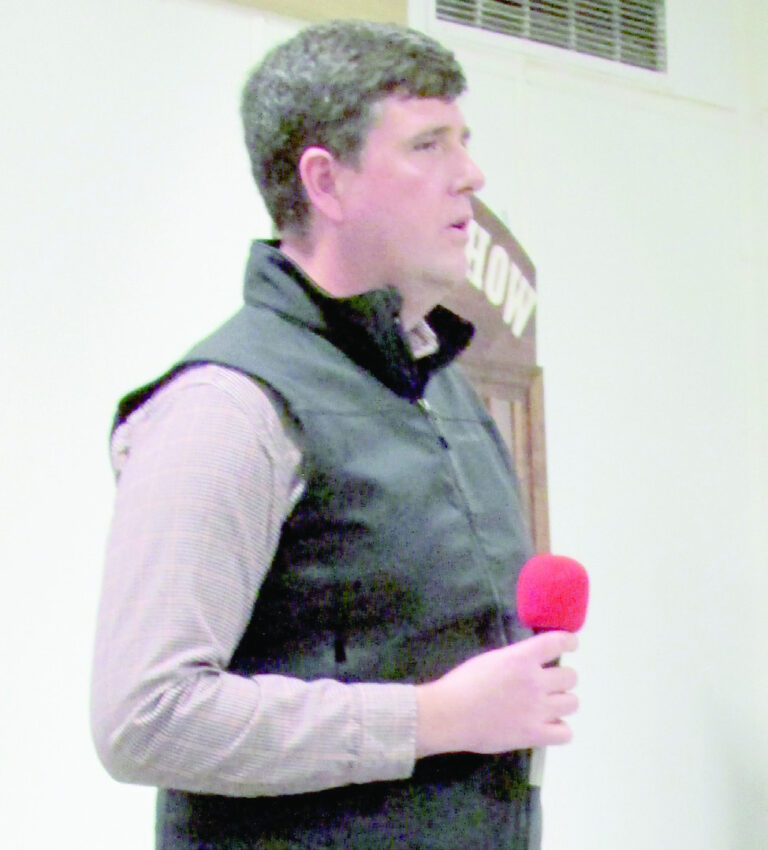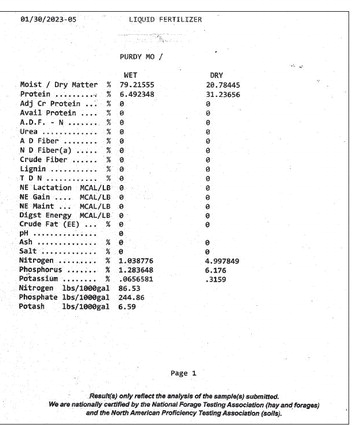A community rallies

By Sheila Harris [email protected]
A crowd of some 200 landowners from Newton, McDonald and Barry Counties were present at the Newton County Fairgrounds in Neosho Friday night to voice their concerns and questions about the land-application of wastewater residuals by Arkansasbased Denali Water Solutions (Denali).
State and county legislators and representatives of the Missouri Department of Natural Resources (DNR), as well as members of the Denali Environmental team, were present to listen to the concerns of residents.

Many complaints focused on the overwhelming smell emanating from the fields where the food-processing residuals had been land-applied, as well as from Denali’s 2 million gallon waste storage lagoons: one located near Fairview, and the second near Stella.
Vickie Nickles, owner of the Longview Café near Stella, fears her business is in jeopardy because of the odor from a Denali lagoon located four miles northwest of her café.
“I’ve had people walk out of my café because of the god-awful smell coming in from outside,” she said. “I run this café for my income and to serve my community, but it’s getting harder and harder to do.”
Kariann Abbott, a young mother who lives near the same Denali lagoon, was overcome by tears as she stepped up to the lectern and offered an emotional message that resonated with fellow landowners.
“I’m worried about the children,” Abbott said. “I have to keep my 2-yearold daughter in the house because of the smell, and the children who go to school in Stella don’t want to go outside to play at recess anymore. When elementary-age kids don’t want to go outside to play, it means we have a real problem.”
Triway Elementary School in Stella is located five miles northeast of Denali’s Gideon Lagoon.
According to Heather Peters, with the Watershed Protection Section of the Missouri Department of Natural Resources (DNR), neither the Gideon Lagoon nor the Evans Lagoon south of Fairview meet the description of “agrichemical facility,” and thus are not subject to DNR oversight unless obvious runoff or spillage occur.
“On March 20, 2020, [prior to the construction of the Evans lagoon], a representative of Denali Water Solutions submitted a statement that the Denali Evans lagoon did not meet the definition of agrichemical facility in 10 CSR 20-2.010 and included supporting operational information,” Peters said. “Specifically, the facility does not store and mix, transfer, repackage, input/output fertilizers for 30 consecutive days, according to their operational plans.”
Peters said the DNR opted not to dispute that the facility didn’t meet the definition of agrichemical facility.
In addition to odors, landowners at the Neosho meeting expressed concerns about the effect of land-applied residuals on groundwater and, in turn, the water in their private wells.
Their concerns are valid. An EPA study of waterway conditions, conducted in conjunction with the DNR and published in 2020, shows that the south, middle and north branches of Indian Creek – which run near the Denali lagoons – are impaired by bacteria and microbes. The impairment is accompanied by the degradation of aquatic life from unknown causes.
The entirety of Shoal Creek, which originates south of Exeter in Barry County and continues northwesterly through Newton and Jasper Counties is also impaired by bacteria and microbes, until it reaches the Joplin area, where metals take precedence.
In agricultural areas, nitrates can make their way into private wells from the land-application of fertilizers, where they can adversely affect infants and other vulnerable individuals.
The Barry County Health Department in Cassville offers nitrate testing to determine if private well water is in excess of the 10 ppm (parts per million) limit established as safe for drinking water.
Environmental Specialist Jan Cox-Drews said not too many people have been taking advantage of the $5 nitrate test, although more people requested it in 2022 than they did the year before. According to Cox-Drews, some of those samples did come back positive for excess nitrates.
McDonald County resident Caleb Wardlaw, who lives in Thomas Hollow just west of the Barry County line, was the first person to report concerns about the land-application of Denali wastewater residuals to the Cassville Democrat early in 2022.
“I’m unequivocally against Denali using our area as a cheap dumpsite,” he said during Friday night’s meeting in Neosho. “To highlight the reality of this abuse and consequent disparity, I’d like to note that unlike cattle producer’s profits, Tyson’s gross profits climb year after year higher and higher, each new year bringing record profits. While simultaneously, in this time of ‘economic hardship,’ their 2023 first quarter operating costs did not go up — but instead, were down 467 million dollars from a year ago.
“Part of the reason those costs are down is because our community subsidizes them. We do this by allowing them to irresponsibly use our neighborhood as a cheap dump site for their waste.”
His words received a hearty round of applause from listening attendees.
Lab results from one test sample of Denali residuals drawn from a tanker and recently submitted for analysis by a Barry County landowner show a high ratio of phosphorus compared to its nitrogen content.
“This time of year, the nitrogen — in liquid form — will be washed away before it would ever be beneficial to plants,” said the landowner, whose identity is being withheld.
He said he’s more concerned, though, about the phosphorus content, which is almost three times higher than the nitrogen content. Although he said he’s no agronomist, the landowner believes damage to fields and future crop yields could result from that ratio if used over the long-term.
That particular ratio of nitrogen to phosphorus, however, may not be consistent across the multiple loads of residuals Denali hauls for various facilities.
Samples from every load are not tested, said Gabe Timby, director of Environmental for Denali, who bravely took the lectern toward the end of the evening to face accusations and questions from an emotional audience.
“We test samples from the facilities that we haul loads from once or twice a year,” Timby said.
Results from fertilizers samples are then provided to the Missouri Fertilizer Control Board and filed with the DNR.
David Compton, director of Barry County Emergency Management, who was present at the meeting, likened Denali’s testing of its own product to the fox guarding the hen house.
One attendee who lives near the Gideon lagoon said she thought third-party testing of samples was definitely in order.
“Another issue is that Denali calls their residuals fertilizer,” said the same landowner, who has experience working in the Hazardous Material (Hazmat) compliance field. “If a company can avoid calling their product waste, they don’t have an obligation to classify it as hazardous or non-hazardous.”
Timby informed the audience that his company is working on better odor control for their residuals.
He also clarified for audience members who are following the series of Cassville Democrat articles that last year, Denali spread over 300 million gallons of residuals in Arkansas, whereas 100 million were land-applied in the entire state of Missouri.
“We’re not breaking the law,” Timby assured the audience.
Scott Cupps, Missouri House representative for the 158th District – which includes Barry and McDonald Counties – relieved Timby of his position at the lectern and told the audience he agreed with Timby, that Denali is not breaking the law in Missouri.
“I commend Denali representatives for being here tonight,” he said. “The buck stops with me. We’ve been getting an insane number of calls to our office about Denali. For the past two years, I’ve been working with legislators and discussing ways to address those concerns.
“As a Barry County landowner, I’m concerned about the land-application of Denali’s wastewater residuals, too, but we’ve got to close the loopholes [that allow them to do this] the right way.”
Cupps emphasized more than once, “We need facts to take to Jefferson City, not rhetoric.”
“We’ve got to make sure we’re not punishing the agricultural community [as a whole] while trying to protect our environment,” he said.
Cupps is concerned because the DNR is being called negligent, and he refused to allow DNR representatives to step to the lectern to face the audience.
Based on 2022 Cassville Democrat interviews with Peters and Steve Taylor, director of the Missouri Fertilizer Control Board, it appears that, as a regulatory agency, the DNR’s hands are tied by the permissiveness of the Missouri Fertilizer Control Board, which authorizes fertilizer permits to companies that claim to have at least one plant nutrient as a component of their waste. Those permits then count as exemptions with the DNR and cover the transportation and land-application of those products.
“If companies provide a sample report that shows their product contains either nitrogen, phosphorus or potash, we feel obligated to issue them a permit,” Taylor said in early 2022.
Those permits can be limited by the DNR, however, if pollutants are present. According to DNR fact sheet PUB3049, pollutants of concern are pathogens, chlorides and oil and grease.
Denali’s fertilizer permit for the land-application of wastewater from the BCP Ingredients facility in Verona was revoked in early 2020 because of the elevated and consistent presence of 1,4-Dioxane in its wastewater. BCP sits within the footprint of one of the EPA’s earliest National Priorities List (NPL) Superfund Cleanup sites, where soil and groundwater have been monitored since the Syntex site was added to the NPL in 1983. While 1,4-Dioxane is labeled “a probable carcinogen” by the EPA, other facilities with whom Denali contracts are not required by the DNR to test for it, Peters said.
The BCP plant is unique because it operates on a Superfund site and the EPA has oversight, she said.
Not all who attended the Neosho meeting were averse to Denali’s practices. Reagan Bluel, dairy specialist with the University of Missouri Extension, provided a balancing perspective.
“Denali’s residuals have been applied to thousands of acres in our area without insult,” she said. “With fertilizer prices out of sight, farmers are looking for options.”
Cupps said a system of checks and balances needs to be put in place.
“In southwest Missouri, we like our freedoms, but we also don’t like being dumped on,” he said.
Cassville resident Gary Fields said nothing is free.
“Free fertilizer for some people might end up costing all of us a lot,” he said.
The meeting in Neosho was organized and hosted by the local Harry S. Truman Coordinating Council (HSTCC) – a regional planning commission representing Newton, McDonald, Jasper and Barton Counties.
Missouri Senator Jill Carter, who represents the 32nd District (Jasper and Newton Counties), commended those who were in attendance.
“This is how government is supposed to work,” she said.
Members of the Missouri Fertilizer Control Board were invited, but did not attend.




